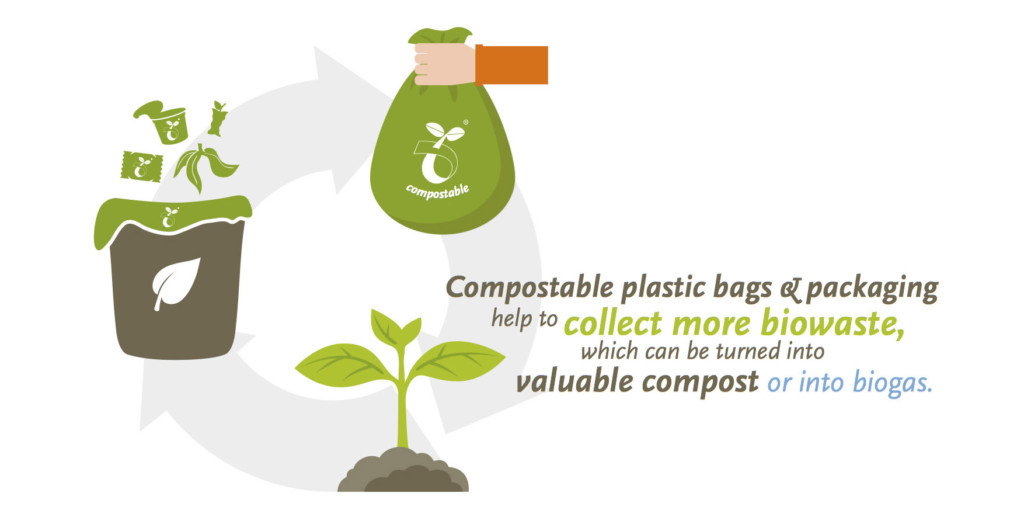At the beginning of this year, the European Commission published its EU Roadmap for a Strategy on Plastics in a Circular Economy. In the Roadmap, the Commission has given priority to assess how to decarbonize the plastics economy and to increase efficiency of waste management with a strong focus on recycling of plastic in order to help the transition from a linear to a circular economy model. One important point missing in the roadmap, however, is the need to consider recycling as organic recycling and mechanic recycling. Only if the separate collection of bio-waste and organic recycling is encouraged, the quality of other waste streams as well as the efficiency of waste management altogether can be increased.
In this context, biodegradable plastics can play an essential part in putting the envisioned circularity model into practice. Discussing biodegradation of plastics only from a ‘leakage into the environment point of view’ will not help to implement sound circular waste management. EUBP therefore calls on the European Commission to focus on circularity when discussing biodegradation of plastics and to consider organic recycling (industrial composting and anaerobic digestion) and proven products and applications for biodegradable products that are certified according to harmonised standards (EN 13432) and labelled accordingly.
Not all packaging should be made from biodegradable plastics. But there are several key products and applications that can amplify the benefits and contributions of biodegradable plastics to a circular economy. The following list can contribute to a more concrete discussion and can show that biodegradable plastics help to prevent and reduce waste.
Compostable bio-waste bags, fruit & vegetable bags, lightweight carrier bags
Compostable bio-waste plastic bags support the separate collection of organic waste. They are a convenient, clean, and hygienic tool, which helps households to collect more kitchen and garden waste while reducing the misthrow rate of conventional plastics in organic waste streams. Likewise, compostable fruit and vegetable bags and lightweight carrier bags first serve as a convenient way for shoppers to carry home groceries and can afterwards be used to collect biodegradable kitchen and food waste.

Benefits of compostable plastic packaging © European Bioplastics
Coffee capsules and tea bags
After they have been used, the organic content (coffee or tea residues) and the capsules or bags are difficult to separate, leading to confusion about the appropriate way of disposal as well as misthrows. Coffee capsules and tea bags made from fully compostable plastics provide the same performance while offering an alternative that can be organically recycled together with the organic content. Coffee and tea waste are highly desired in industrial composting plants as they stimulate microbial activity in the composting process.
Compostable fruit labels
Using fruit labels made from conventional, non-biodegradable plastics causes significant amounts of plastic to be discarded in bio-waste bins, as consumers will rarely remove these labels from fruit peels before disposing them in the bio-waste. Compostable fruit labels can remain attached to and be discarded together with fruit peels without introducing impurities to the bio-waste stream.
Thin film applications for fruit and vegetable packaging
Food that has past its expiry date and is packed in conventional plastic packaging is usually not separated from its packaging. The plastic packaging together with its contents is usually either thrown into the bio-waste bin, where it constitutes an impurity, or the biodegradable food content still inside the packaging ends up in the residual waste bin and is no longer available for organic recycling and thus wasted as a possible valuable resource. Compostable plastic packaging can help to solve this problem as it can be discarded and recycled together with its organic contents. When discussing these specific applications in the context of a circular economy, EUBP recommends focussing on thin film packaging applications that are highly food-contaminated with a thickness below 100 microns such as fruit and vegetable packaging (e.g. cucumber wrappings, flow packs).